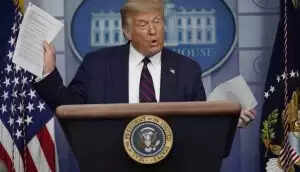Trump's Bold Tariff Threats: Will China Respond?
Trump's Ultimatum to China

In a recent statement, President Donald Trump has issued a stark warning to China, proposing an additional 50% tariff that would elevate the total tariffs to exceed the value of the goods imported from China. This announcement was made via Truth Social on Monday, where he stated that if China does not retract its 34% tariff increase by April 8, 2025, the US will implement these new tariffs starting April 9.
Trump also declared that he would cease any ongoing negotiations regarding tariffs with Beijing. If these tariffs are enacted, the cumulative tariffs could reach an astonishing 104%.
The ongoing tariff dispute poses a significant risk to American consumers who depend on Chinese imports for everyday products, especially if neither side concedes.
This ultimatum follows China's announcement of a 34% tariff on US imports, which mirrors the reciprocal tariff Trump had previously announced.
When asked about pausing the reciprocal tariffs, Trump firmly stated, 'We’re not looking at that.'
After a meeting with Israeli Prime Minister Benjamin Netanyahu, Trump expressed his willingness to endure the economic strain, believing that a favorable outcome is on the horizon.
His threats coincided with a slight recovery in US stock markets, with the NASDAQ gaining 0.1% on Monday, while the S&P Index saw a minor decline of 0.23%.
There was a brief surge in the S&P when rumors of a potential 90-day pause on tariffs circulated, but this was quickly dismissed by the White House.
Trump emphasized that the US is making significant strides with various nations, noting that countries that previously took advantage of the US are now eager to negotiate.
Following a conversation with Japanese Prime Minister Shigeru Ishiba, Trump revealed that Japan would be sending a delegation to discuss trade.
Secretary of State Marco Rubio also engaged in discussions with India's External Affairs Minister S. Jaishankar regarding reciprocal tariffs and the pursuit of a fair trade relationship.
European Union President Ursula von der Leyen proposed a 'zero-for-zero' agreement, suggesting the elimination of tariffs on industrial goods, including automobiles, if the US reciprocates.
She cautioned, however, that the EU is prepared to implement countermeasures to protect itself from any adverse effects of trade diversion.
Reports indicate that the EU plans to introduce its own reciprocal tariffs in two phases, with the first set to occur next week and another in May.
Republican Senators Mike Lee and Ron Johnson have publicly urged Trump to consider the EU's proposal.
While no specific tariff concessions for Israel were disclosed, Netanyahu assured that Israel would work towards eliminating the US trade deficit with his country, proposing this as a potential model for other nations.
